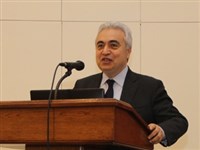 On April 18, Dr. Fatih Birol, executive director of the International Energy Agency (IEA), visited Bilkent University to deliver a lecture on the global energy system and its trajectory over the next decade. The lecture was hosted by the FEASS Energy Economics, Policy and Strategies (EEPS) MA program.
On April 18, Dr. Fatih Birol, executive director of the International Energy Agency (IEA), visited Bilkent University to deliver a lecture on the global energy system and its trajectory over the next decade. The lecture was hosted by the FEASS Energy Economics, Policy and Strategies (EEPS) MA program.
This was Dr. Birol’s first visit to Bilkent since his appointment to the top post at the IEA. In his talk, he discussed how China’s shift away from a low-cost manufacturing-based growth model to a less energy-intensive one will affect global energy markets and what impact the current price levels will have on the demand for various energy sources. Dr. Birol predicted that oil prices will gradually stabilize slightly above their current levels over the next few years. This, he argued, will have major consequences for world energy markets, including an increase in the importance of the oil-rich states in the Middle East that produce oil less expensively than their competitors in other regions.
Another central theme of Dr. Birol’s talk was the rapidly increasing competitiveness of renewable energy sources, which contributed a major portion of the world’s new power generation capacity in 2015. While noting the historic importance of the COP21 Paris Agreement for the move toward lower-carbon energy production, Dr. Birol argued that industrialized countries should do more in this area than what is envisioned in their current climate pledges.
The talk was part of the Policy Skills and Strategic Analysis course (EEPS 504) taught by Asst. Prof. Berk Esen for the EEPS MA program. Well attended by Bilkent faculty members and students, the event also drew key players in the Turkish energy sector as well as diplomatic representatives from over 20 countries.
